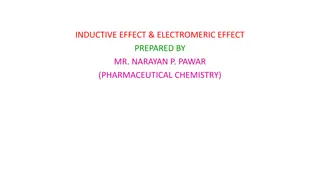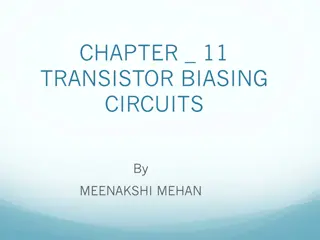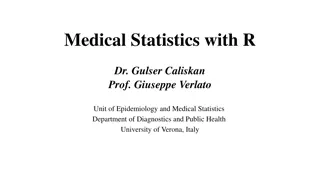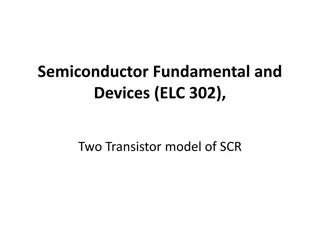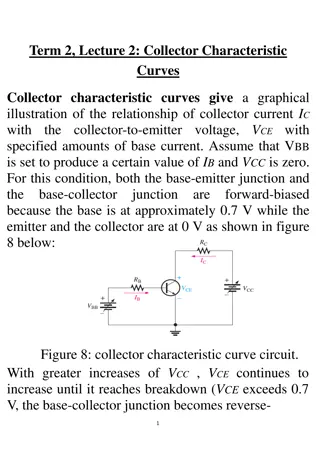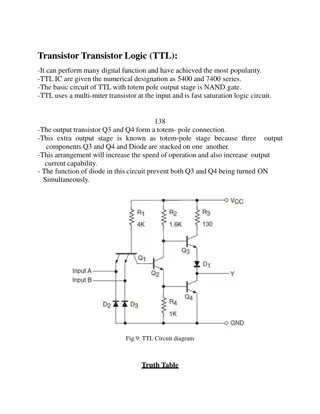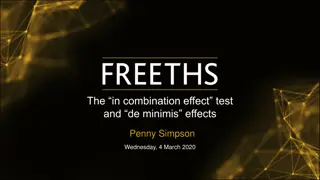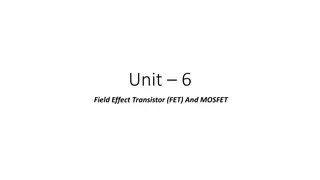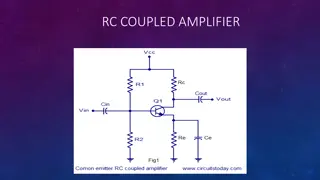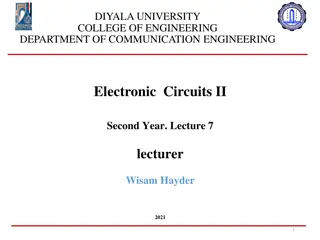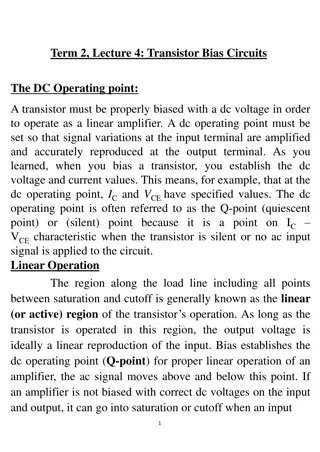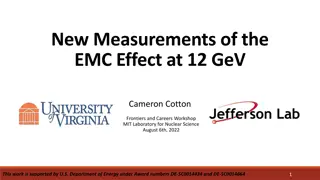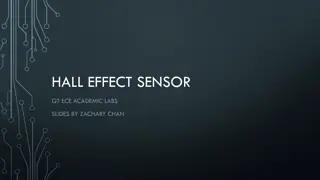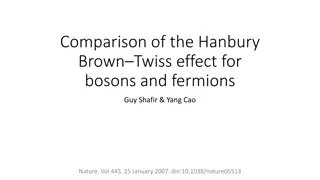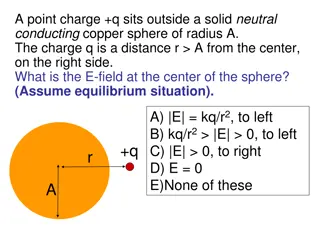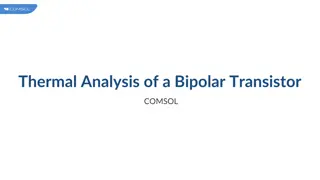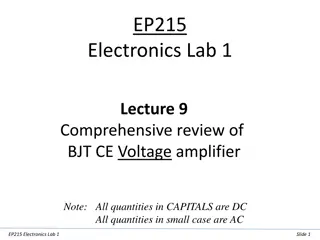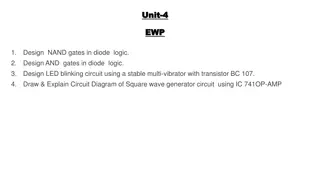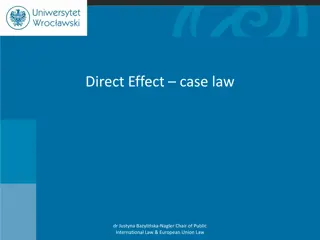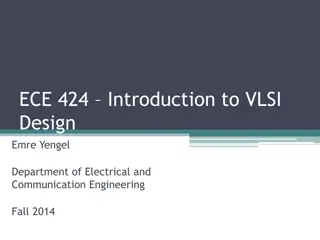Understanding the Silo Effect in Business Organizations
Organizational silos in companies hinder communication between units, leading to inefficiencies and potential losses. The Silo Effect occurs due to the lack of cross-departmental communication, often exacerbated by different departmental goals and incentives. To eliminate the Silo Effect, companies
4 views • 9 slides
Logic Families
Logic families such as Diode Logic (DL), Resistor-Transistor Logic (RTL), and Diode-Transistor Logic (DTL) each have distinct capabilities and limitations when it comes to performing logic functions. While DL gates are simple and inexpensive but limited in functionality, RTL gates offer both normal
1 views • 22 slides
Understanding the Inductive and Electromeric Effects in Organic Chemistry
The inductive effect in organic chemistry is the polarization of a bond due to electron-donating or withdrawing effects of adjacent groups, leading to a degree of polarity in the bond. This effect is distance-dependent and can be either electron-withdrawing or electron-releasing. On the other hand,
0 views • 12 slides
Determining Sample Size for Research Studies: Factors and Considerations
Sample size estimation in research is a crucial step that involves various factors such as effect size, population standard deviation, power of the experiment, and significance level. The effect size indicates the practical significance of research findings, with common measures like Cohen's d and P
2 views • 24 slides
Principles of Supremacy, Direct Effect, Indirect Effect, and State Liability in European Legislation
This lecture delves into the essential principles of supremacy, direct effect, indirect effect, and state liability within European Legislation, focusing on the foundational aspects and development by the CJEU. It emphasizes the concept of EU law's absolute supremacy over national laws for the achie
2 views • 33 slides
Understanding Average Gene Effect and Breeding Value in Animal Genetics
In the field of animal genetics and breeding, it is crucial to comprehend the average effect of genes and breeding value of individuals. Genes are transmitted from parents to offspring through haploid gametes, influencing the genotype and breeding potential. Estimating the average effect of a gene i
5 views • 26 slides
Transistor Biasing Circuits: A Comprehensive Overview
Biasing is crucial for the proper functioning of transistor circuits, ensuring they operate in the active region as amplifiers. This process involves setting DC voltages to establish the correct operating conditions for the transistor. By providing the necessary biasing, amplification of small input
0 views • 41 slides
Understanding Sample Size and Effect Size in Medical Statistics
Explore the crucial aspects of power analysis, sample size determination, effect size estimation, and their interrelations in medical statistics. Learn how these components influence experimental design and decision-making in research studies. Discover the significance of adequately balancing sample
1 views • 46 slides
Introduction to Uni-Junction Transistor (UJT) in Electronic Semiconductors
Uni-Junction Transistor (UJT) is a semiconductor switching device with unique characteristics, such as regenerative emitter current increase when triggered, leading to a negative resistance region. It finds applications in sawtooth and pulse generation, switching, and triggering SCRs & TRIACs. The U
0 views • 15 slides
Understanding the Two-Transistor Model of SCR for Beginners
Explore the two-transistor analogy of SCR, a method illustrating SCR as a combination of PNP and NPN transistors. Discover how the working principle is easily explained through this model, showcasing the transition from off to on state when triggering the SCR. Uncover the accumulative action of curr
0 views • 8 slides
Understanding Cause and Effect Essays in English Education
In this lesson, students learn about cause and effect essays by analyzing the causes and effects of smoking. They identify key linkers used in such essays and practice linking causes and effects. The lesson aims to enhance students' skills in writing cause and effect essays effectively.
6 views • 19 slides
Understanding Electric Field Lines and Charges
Electric field lines provide a visual representation of the electric field around charges. They show the direction of the electric field and help understand the intensity of the field at different points. Field lines never cross each other and the tangent at any point on a line gives the field direc
2 views • 40 slides
Understanding Transistor Operation through Collector Characteristic Curves
Collector characteristic curves provide insight into the transistor's operation in various regions such as cutoff, saturation, and active. By analyzing the relationship between collector current (IC) and collector-to-emitter voltage (VCE) with base current variations, one can understand how a transi
0 views • 7 slides
Understanding Bipolar Transistor Configurations for Electronic Circuits
Explore the three common configurations - Common Base, Common Emitter, and Common Collector - for Bipolar Transistors in electronic circuits. Each configuration offers unique characteristics such as voltage gain, current gain, and impedance levels, impacting the signal processing and amplification c
0 views • 27 slides
Understanding Transistor-Transistor Logic (TTL) Circuits
Transistor-Transistor Logic (TTL) is a popular digital circuit technology known for its speed and reliability. This technology utilizes totem pole output stages for efficient performance. TTL logic gates have varying characteristics like power dissipation and speed, making them suitable for differen
0 views • 5 slides
Understanding the In-Combination Effect Test and De Minimis Effects in Environmental Assessments
This content discusses the complexities of the in-combination effect test and de minimis effects in environmental impact assessments. It covers when the in-combination effect assessment is needed, the legislation surrounding such assessments, and the concept of no appreciable effect as a threshold f
0 views • 21 slides
Evolution of Semiconductor Devices in Modern Electronics
The lecture discusses the fundamentals of semiconductor drift and diffusion currents, diode behavior, transistor characteristics, and amplifier circuits in ECE 255. It explores the origins of modern electronics, from the invention of the bipolar transistor to the evolution of electronic devices thro
0 views • 35 slides
Understanding Field Effect Transistor (FET) and MOSFET Principles
Explore the construction, principles, characteristics, and relationships among parameters of Junction Field Effect Transistors (JFET) through detailed explanations and diagrams. Dive into the equation of drain characteristics and the resemblance to a parabolic curve. Understand the differentiation p
0 views • 9 slides
Understanding RC Coupled Amplifiers and Transistor Basics
Amplification is the process of increasing signal strength without changing its characteristics. An RC coupled amplifier is a multistage amplifier using resistors and capacitors. Transistor amplifiers amplify signals based on transistors with different configurations. The common emitter configuratio
0 views • 23 slides
Transistor Tuned Amplifiers: Operation and Analysis
Transistor tuned amplifiers consist of a parallel tuned circuit as the collector load, amplifying a specific frequency while rejecting others. The resonant frequency of the tuned circuit is crucial for amplification. A high Q circuit offers maximum voltage gain at the resonant frequency but decrease
0 views • 30 slides
Understanding Transistor Bias Circuits for Linear Amplification
Transistor bias circuits play a crucial role in setting the DC operating point for proper linear amplification. A well-biased transistor ensures the signal variations at the input are accurately reproduced at the output without distortion. Various biasing methods such as Voltage-Divider Bias, Emitte
0 views • 7 slides
New Measurements of the EMC Effect at 12 GeV - Frontiers and Careers Workshop
In this workshop, new measurements of the EMC Effect at 12 GeV were discussed, shedding light on one of the biggest unsolved mysteries in nuclear physics. The discovery, prediction, and quantification of the EMC Effect were explored, raising questions about modifications in nucleon structure within
2 views • 30 slides
Understanding the Greenhouse Effect and Its Impact
The greenhouse effect is the trapping of the sun's warmth in a planet's lower atmosphere, primarily by greenhouse gases like carbon dioxide and water vapor. These gases absorb and re-emit infrared radiation, which leads to an increase in temperatures. While carbon dioxide and water vapor are signifi
1 views • 13 slides
Understanding Global Warming and the Greenhouse Effect
Scientists attribute the observed global warming trend to human activities that enhance the greenhouse effect, trapping heat in the atmosphere. The greenhouse effect, crucial for life on Earth, involves gases like water vapor and methane that contribute to warming. Nitrous oxide, another potent gree
0 views • 13 slides
Understanding the Greenhouse Effect and Electromagnetic Radiation
The presentation delves into the science behind the greenhouse effect, explaining how human activities contribute to the enhanced greenhouse effect. It explores the composition of Earth's atmosphere, the role of greenhouse gases, and the impact of burning fossil fuels. Additionally, it covers the ba
0 views • 15 slides
Understanding Hall Effect Sensors in Electronic Labs
Hall Effect sensors play a crucial role in detecting magnetic fields, enabling applications such as current sensing, rotational speed measurement in motors, and magnetic proximity sensing. They operate based on the Hall Effect phenomenon, where a magnetic field influences the flow of current in a se
2 views • 5 slides
Understanding the Hall Effect in Conductors
The Hall Effect in conductors is described in detail, showcasing how a magnetic field affects the conductivity tensor, breaking symmetry and leading to unique properties. The discussion covers the separation of the conductivity tensor, the impact of magnetic fields on conductivity components, and th
1 views • 16 slides
Understanding the Rebound Effect in Energy Efficiency: Implications and Considerations
The rebound effect in energy efficiency refers to the phenomenon where energy savings from efficiency improvements are partially offset by increased usage or spending elsewhere. This comprehensive study delves into the direct and indirect rebound effects, scales of impact, reasons why promised savin
0 views • 15 slides
Understanding the Disposition Effect in Investment Behavior
Investors often exhibit the disposition effect by selling winning stocks too early and holding onto losing stocks for too long due to a desire to avoid regret and seek pride. This behavior can lead to missed opportunities for higher returns and negative tax consequences. Studies show that awareness
0 views • 24 slides
Comparison of Hanbury Brown Twiss Effect for Bosons and Fermions
This study compares the Hanbury Brown Twiss (HB&T) effect for bosons and fermions, showcasing how different correlation functions apply to these particles in quantum systems. The analysis delves into the mathematical structures and order correlations for both bosons and fermions, illustrating the ph
0 views • 13 slides
Understanding Cause and Effect: How Choices Impact Outcomes
The cause and effect relationship is explored in this essay, focusing on how wearing shoes with high heels can lead to foot problems. The writer uses a cause/effect pattern to explain how one action can result in another. Examples are provided to illustrate this concept, such as eating uncooked meat
0 views • 11 slides
Field Fund Working Group Meeting Insights and Analysis
The Field Fund Working Group Meeting #4 held on December 9, 2020, virtually discussed various topics related to field fund allocations, fee considerations, and capital improvement plans. The meeting covered important aspects such as benchmarking, investment in capital projects, recurring field maint
0 views • 38 slides
Understanding Electric Fields and Charges in Different Scenarios
Explore various scenarios involving electric fields and charges such as the E-field at the center of a conducting sphere, the effect of total charge on E-field, E-field above a charged conductor, charge distribution on the surface of a copper sphere with a hollow, field inside a charged non-conducti
0 views • 9 slides
Emerging Materials for MOS-Transistor Gate Stacks in Semiconductor Technology
Advancements in semiconductor technology necessitate the adoption of new materials for gate stacks in MOS-transistors, addressing issues like gate leakage current and gate oxide problems. With the continual scaling down of MOSFETs, the use of high-K materials offers solutions to enhance performance
0 views • 51 slides
Thermal Analysis of a Bipolar Transistor Using COMSOL
This model utilizes a COMSOL simulation to analyze the thermal behavior of a bipolar transistor. The heat transfer within the device is calculated to determine the temperature distribution. Various plots, such as the Gummel plot and current gain curve, illustrate the collector and base currents as f
1 views • 11 slides
Comprehensive Review of BJT CE Voltage Amplifier in Electronics Lab
This lecture provides a comprehensive review of the BJT CE voltage amplifier circuit, starting with theoretical concepts and moving towards practical implementations. It covers the operation of the BJT as a switch, the addition of resistors for current control, DC design considerations, AC voltage g
0 views • 19 slides
Exploring Diode and Transistor Logic Circuits for LED Blinking and Logic Operations
Dive into the world of diode and transistor logic circuits with designs for NAND and AND gates, as well as LED blinking circuits using stable multi-vibrators. Learn how these circuits function and discover the components involved in creating a square wave generator. Explore the practical application
0 views • 9 slides
Direct Effect of Legal Provisions in EU Law: Case Law Overview
Explore the concept of direct effect in European Union law through a comprehensive overview of case law examples, including vertical and horizontal direct effect of treaty provisions, international agreements, regulations, decisions, and directives. Learn about the implications and application of di
0 views • 13 slides
Understanding MOSFET: Basics and Applications
MOSFET, or Metal Oxide Semiconductor Field Effect Transistor, is a key component in modern electronics. This presentation by Poonam Sharma covers the working principles, types, and applications of MOSFETs. Exploring the insulated gate feature, voltage control, and construction details, it explains h
0 views • 12 slides
VLSI Design Methodologies and Layout Rules: A Comprehensive Overview
This detailed content provides an in-depth exploration of VLSI design methodologies and layout rules, focusing on topics such as standard cell layout methodology, transistor dimensions, design rules for n-well process, and more. The information covers important aspects like minimum widths, spacings,
0 views • 35 slides


